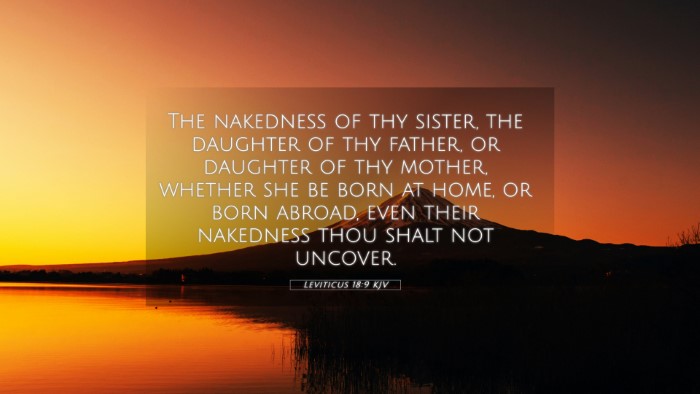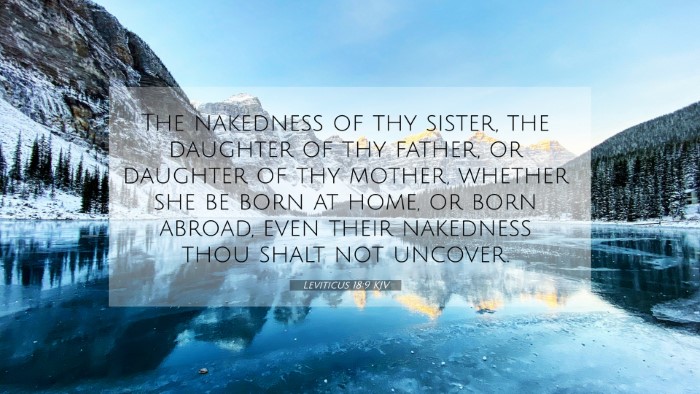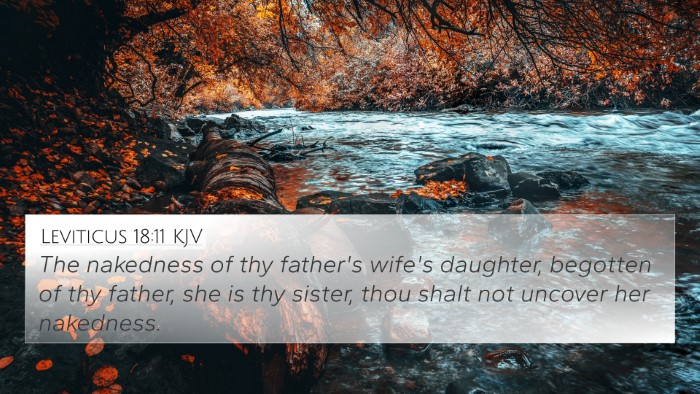Understanding Leviticus 18:9
Leviticus 18:9 states:
"The nakedness of your sister, the daughter of your father, or the daughter of your mother, whether born at home or born outside, their nakedness you shall not uncover."
Verse Meaning and Interpretation
This verse is part of a larger section of Leviticus, which outlines various laws related to sexual conduct and familial relationships. Here are summarized insights from public domain commentaries:
-
Matthew Henry's Commentary:
Henry emphasizes the importance of maintaining moral boundaries within familial relations. He explains that this law serves to preserve the sanctity of family ties and prevent incestuous relationships, which are detrimental to social order and personal holiness.
-
Albert Barnes' Notes:
Barnes highlights that this commandment reiterates the need for respect and dignity within family units. He points out that uncovering nakedness represents a violation of privacy and trust, stressing the severe societal implications of such actions.
-
Adam Clarke's Commentary:
Clarke notes that the term 'nakedness' signifies more than physical exposure; it refers to intimate relations. He further asserts that the laws outlined are not mere societal constructs but are rooted in divine wisdom aimed at protecting the integrity of family and community.
Bible Verse Cross-References
Leviticus 18:9 can be cross-referenced with several other verses that provide additional context and understanding:
- Genesis 20:12 - Discusses family relations.
- Deuteronomy 27:20 - Prohibited relationships are outlined.
- 1 Corinthians 5:1 - Addresses sexual immorality within the church.
- Leviticus 18:6 - Sets the broader context of prohibitions.
- Romans 1:26-27 - Highlights related immoral relationships.
- Galatians 5:19-21 - Lists the works of the flesh, inclusive of sexual sins.
- Hebrews 13:4 - Affirms the sanctity of marriage.
Thematic Connections
Connections between Bible verses, especially in Leviticus and the teachings of the New Testament, reveal a recurring theme of holiness and moral conduct:
-
Linking Biblical Texts:
Leviticus provides the foundation of moral laws, which are echoed in the teachings of Jesus and the apostles, showing the continuity of God's standards of holiness.
-
Cross-Referencing Biblical Texts:
By examining these laws alongside New Testament scriptures, believers can gain insightful perspectives on maintaining purity in relationships.
-
Thematic Bible Verse Connections:
Exploring Leviticus with Romans elucidates the shift from the law to grace, yet reaffirms the importance of moral purity in the life of a believer.
Tools for Bible Cross-Referencing
For those interested in exploring these connections further, the following tools can assist with a deeper understanding of the contexts:
- Bible Concordance: Helpful for finding specific words and their occurrences throughout scripture.
- Bible Cross-Reference Guide: Offers structured references to similar themes and ideas across verses.
- Bible Chain References: Facilitates linking multiple verses together based on topics for study or sermon preparation.
Conclusion
In conclusion, Leviticus 18:9 serves not only as a commandment against incest but also sets the stage for understanding God’s design for family and holiness. Through the insights from well-known commentaries and connections to New Testament teachings, we can see the importance of maintaining moral integrity in our lives. Utilizing cross-referencing tools enhances the study of scripture, allowing believers to connect various themes and principles throughout the Bible.







